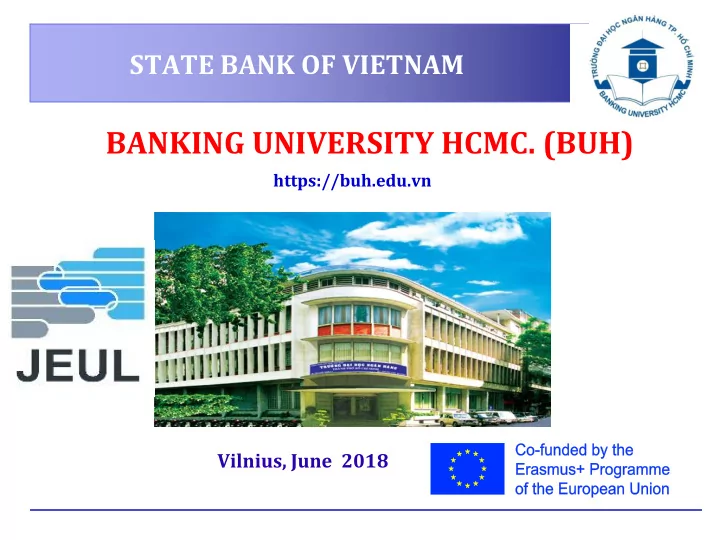

STATE BANK OF VIETNAM BANKING UNIVERSITY HCMC. (BUH) https://buh.edu.vn Vilnius, June 2018
ABOUT BUH Established in 1976 as a Public University (40-year history) and is a special training and research center of the State Bank of Vietnam. Under direct supervision & management of the State Bank of Vietnam (SBV) and the Ministry of Education and Training of Vietnam (MOET). One of the leading universities in research and training in the field of Economics, Banking & Finance, Business Administration & Management. 9 faculties with 300 faculty members and other departments with 140 staff members (front office and back office members) (ratio: 2:1 – means 1 supporting staffs per 2 lecturers).
BUH FACULTIES BUH currently has 9 faculties with 300 faculty members: Faculty of Finance. 1. Gender (F/M Ratio): 2/1 Faculty of Banking. 2. Faculty of Business Administration. 3. Faculty of Accounting and Auditing 4. Faculty of Business Information System Management. 5. Faculty of International Economics. 6. Qualification: 100% Postgraduate Faculty of Foreign Languages. 7. 35% Master Degree Faculty of Business Law. 8. 65% Doctoral Degree Faculty of Political Education. 9. 10% Associate Professor
BUH CAMPUSES BUH has 3 Campuses in Ho Chi Minh City (Vietnam) (1) (Headquater) 36 Ton That Dam Street, District No.1 In Downtown (2) 39 Ham Nghi Street, District No.1 Closedly to (3) 56 Hoang Dieu 2 Street, Thu Duc District “University Village” • BUH has made significant investments in its campuses (especially Thu Duc District Campus) in order to provide modern facilities for studying, teaching and research. It creates a positive learning environment , as well as community health and well-being . 4
CAMPUS NO.1: HEADQUATERS Offices of the Board of President and the front office & back office departments. Gender (F/M Ratio): 1/1 Headquaters Address: 36 Ton That Dam Street, District No.1, Ho Chi Minh City, Vietnam Website: buh.edu.vn BUH VAT Code No.: 0302663035
CAMPUS NO. 2: FACULTIES’ OFFICE AND CENTER FOR INTERNATIONAL TRAINING & COOPERATION Located only 200m away from BUH headquarters in down town. Gender (F/M Ratio): 2/1 Office of Faculties, Library & International School of Business (Intl. Programs & Relations) Address of BUH Campus No.2: 39 Ham Nghi, District No. 1, Ho Chi Minh City, Vietnam
CAMPUS NO.3: MAIN CAMPUS Located closely to “University Village” in Thu Duc District and 15 km distance from Downtown. Gender (F/M Ratio): 2/1 Address: 56 Hoang Dieu 2 Street, Thu Duc District, Ho Chi Minh City, Vietnam
BUH CAMPUS NO.3 DEVELOPMENTS THU DUC DISTRICT CAMPUS
BUH CAMPUS NO. 3 DEVELOPMENTS THU DUC DISTRICT CAMPUS New lecture rooms building with different functions. High quality canteen and sport center for BUH students. Dormitory qualified standards for accommodating international students
CAMPUS NO.3: MAIN CAMPUS Land area is 11 hectares including Learning Centre, Student Accommodations, Sport Centre. The power of SPORT CENTER is to motivate, inspire goes so much further than sporting ability. From keeping fit & leading healthy balanced lifestyles to learning a new activity, students will never have a better opportunity to get involved, have fun and make new friends. Address: 56 Hoang Dieu 2 Street, Thu Duc District, Ho Chi Minh City, Vietnam
FACILITIES OF BUH CAMPUS NO.3 Libraries: 2 libraries in Sai Gon & Thu Duc Campuses. Computer rooms Labs Thu Duc Library in Campus No.3 Sai Gon Library in Campus No.2
FACILITIES OF BUH CAMPUS NO.3 BUH DORMITOTY Thu Duc Campus Dormitory with 2,600 Seats for Students Address: 56 Hoang Dieu 2 Street, Thu Duc District, Ho Chi Minh City, Vietnam
BUH GREAT HALLS Sai Gon Campus Great Hall with 150 Seats Thu Duc Campus Great Hall with 1,000 Seats Functions: Organizing Meeting, Seminar, Workshop and Conference. Hosting many of the University’s primary events throughout the academic calendar, specially graduation ceremonies.
BUH STUDENTS & PROGRAMS Number of current students: 17,000 students Training programs are divided into 4 different major programs (based on teaching language and training program). 1) Local Programs (100% in Vietnamese) 2) High Quality Programs (mainly in Vietnamese, 30%-40% in English) 3) Advanced Programs (100% in English): currently in the first steps of designing, developing and implementing based on the current programs of the high ranking universities in developed countries. 4) International Programs (100% in English) based on training programs and cooperation between BUH and other partners.
BUH LOCAL TRADITIONAL PROGRAMS Postgraduate Programs: 2 Master Programs and 1 Doctoral Programs (1) Master of Science in Banking and Finance (2) Master of Business Administration (3) PhD. in Banking and Finance Undergraduate Programs: 9 Programs (7 +2 programs) 1. Bachelor in Banking and Finance: Concentration on Finance or Banking 2. Bachelor in Business Administration (BA): Concentration on BA or Marketing 3. Bachelor in Accountancy 4. Bachelor in Business Information System (BIS): Concentration on BIS or E-Commerce 5. Bachelor in Business English. 6. Bachelor in International Economics. 7. Bachelor in Business Law.
BUH STUDENT AFFAIRS • Youth Union • Student Association • Social works • Career supports • Student Clubs (Sport, Arts, Academic..) • Soft Skills Training Programs • Scholarships
BUH ALUMNI Many graduates from BUH have become CEOs of many commercial banks and other organizations creating a great connection between BUH and enterprise.
BUH ALUMNI Nguyen Van Giau Tran Xuan Hoang Former Governor – SBV Do Minh Toan Deputy CEO – Bank for Investment Head of Economics Committee – CEO – Asia Commercial Bank and Development of Viet Nam National Assembly Nguyen Thi Kim Phung Nguyen Thi Quyet Tam Former Deputy Governor Chairperson - HCMC People Committee
BUH – INDUSTRY LINKS
BUH – INDUSTRY LINKS http://www.global-engagement.org/study/ https://www.slideshare.net/tripmhs/gei-conference- invitation-women-leadership-in-vietnam-36-ton-that-dam
MEASURING THE EFFECTIVENESS Source: Allen, M. (2002). The corporate university handbook designing, managing, and growing a successful program. New York (USA): AMACOM. Chapter 10.
MEASURING THE EFFECTIVENESS Source: Allen, M. (2002). The corporate university handbook designing, managing, and growing a successful program. New York (USA): AMACOM.
MEASURING THE EFFECTIVENESS Source: Allen, M. (2002). The corporate university handbook designing, managing, and growing a successful program. New York (USA): AMACOM.
Recommend
More recommend